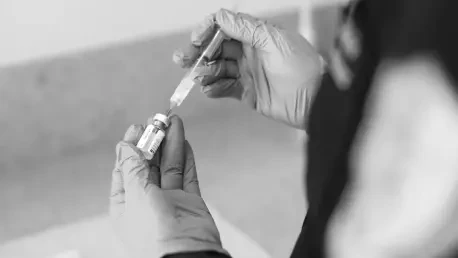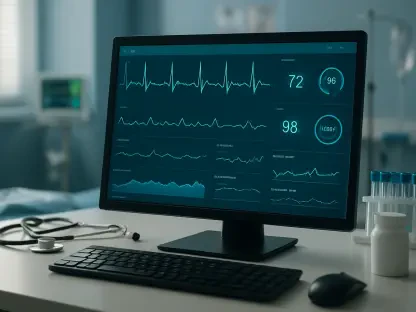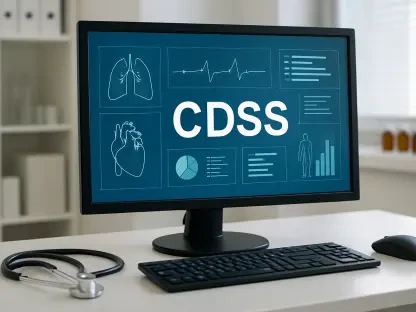Imagine a nation at a crossroads, where decisions made in a single meeting room could determine the health of millions, sparking fierce debates across medical, political, and public spheres. Under the leadership of Health and Human Services Secretary Robert F. Kennedy Jr., the Advisory Committee on Immunization Practices (ACIP) has undergone a dramatic transformation, replacing its entire roster of 17 members with a handpicked panel of seven. This roundup dives into diverse perspectives on this controversial overhaul, gathering opinions from medical professionals, policy analysts, and public health advocates. The purpose is to explore how this shift influences vaccine policy in the United States, particularly with a pivotal ACIP meeting on September 18 and 19 addressing recommendations for COVID-19, hepatitis B, measles, and potentially respiratory syncytial virus.
Examining the Revamped ACIP Landscape
Voices on the Shift in Vaccine Oversight
The reconstitution of ACIP has drawn sharp reactions from various corners of the health sector. Many public health experts express concern over the reduction in panel size and the selection process, arguing that a smaller, specifically chosen group might lack the diverse expertise needed for balanced recommendations. Some note that the timing of this change, just before critical decisions on multiple vaccines, heightens the risk of skewed policy outcomes.
In contrast, a segment of policy observers suggests that a streamlined committee could lead to quicker, more decisive actions, potentially cutting through bureaucratic delays. However, even among these voices, there is unease about the apparent alignment of the new panel with vaccine-skeptical viewpoints, which could steer federal guidance away from established scientific norms.
A third perspective comes from grassroots health advocates who see this overhaul as a chance to challenge long-standing vaccine narratives. While acknowledging the need for rigorous safety measures, they argue that opening the floor to alternative viewpoints might address public concerns about transparency and trust in health institutions.
Reactions to the September Meeting’s Stakes
With the ACIP meeting looming large, stakeholders are buzzing with anticipation and apprehension. Medical associations emphasize the urgency of maintaining robust vaccine recommendations, particularly for vulnerable populations. They warn that any hesitation in endorsing updates for diseases like COVID-19 could undermine years of progress in disease control.
Policy analysts, on the other hand, highlight the broader implications of this meeting, pointing out that decisions made now could set precedents for how future public health crises are handled. Some express cautious optimism that regional health bodies might step in to fill gaps if federal recommendations falter, ensuring continuity in vaccination efforts.
Community leaders add another layer to the discussion, focusing on public perception. They stress that clear communication from ACIP will be vital to prevent misinformation from spreading, especially given the already polarized views on vaccines. Their concern centers on how decisions might be interpreted at the local level, potentially affecting community health initiatives.
Perspectives on Vaccine Skepticism in ACIP
Debating Safety and Efficacy Concerns
The new ACIP panel’s skepticism toward COVID-19 vaccines has become a focal point of contention. Representatives from major medical organizations argue that the panel’s questioning of well-documented safety and efficacy data during initial meetings disregards decades of research. They fear this stance could erode public confidence in immunization programs.
Conversely, some independent health commentators defend the panel’s approach, suggesting that rigorous scrutiny of vaccine components, including debated preservatives, is a necessary step to ensure utmost safety. They argue that such caution reflects a commitment to addressing lingering doubts among certain population segments, potentially increasing long-term trust.
A middle ground emerges from academic circles, where scholars advocate for a balanced dialogue. They propose that while skepticism should be acknowledged, it must be grounded in empirical evidence rather than anecdotal concerns, ensuring that policy remains tethered to scientific consensus while still being responsive to public queries.
Policy Restrictions and Medical Pushback
Kennedy’s influence on restricting COVID-19 booster eligibility to adults over 65 and high-risk younger adults, alongside halting recommendations for pregnant women and healthy children, has sparked significant backlash. Pediatric health groups point out that their own guidelines strongly support broader vaccination, creating a stark policy divide that could confuse healthcare providers and patients alike.
Some insurance industry analysts weigh in with practical concerns, noting that limited ACIP endorsements might lead to reduced coverage for vaccines. They caution that such outcomes could disproportionately impact lower-income families who rely on insured access to maintain immunization schedules.
Legal experts also contribute to the discourse, highlighting ongoing challenges from medical communities against these restrictions. They suggest that the push for an alternative advisory body by former ACIP members reflects a deeper struggle to preserve evidence-based policymaking amidst shifting federal priorities.
Impacts and Implications from Diverse Angles
Access and Coverage Challenges
The potential for ACIP recommendations to affect vaccine availability has many stakeholders on edge. Health economists predict that a refusal to endorse boosters for the coming seasons, such as from 2025 to 2027, could relieve insurers of coverage obligations, creating significant barriers for the general population. This scenario raises alarms about widening health disparities.
Nonprofit organizations focused on public health access argue that a federal retreat from broad vaccine support could leave vulnerable groups, such as the elderly and immunocompromised, at heightened risk. They call for contingency plans to ensure that local clinics and pharmacies can still provide necessary shots regardless of national policy shifts.
Meanwhile, private sector voices from pharmaceutical backgrounds stress the need for clarity in ACIP’s stance to maintain production and distribution chains. They warn that uncertainty in federal recommendations could disrupt supply planning, ultimately affecting even those regions willing to uphold vaccination efforts independently.
Political and Administrative Turmoil at CDC
The administrative shake-up at the Centers for Disease Control and Prevention (CDC), marked by the White House’s removal of its director and subsequent resignations of key officials, adds another layer of complexity. Government watchdogs critique this power vacuum, suggesting that it amplifies the influence of a vaccine-skeptical ACIP under Kennedy’s endorsement, potentially sidelining traditional checks and balances.
State health officials offer a contrasting view, emphasizing their readiness to counter federal policy if it strays too far from protecting public health. They argue that regional autonomy in vaccination programs could serve as a buffer, maintaining immunization rates despite national hesitancy.
Public opinion researchers also chime in, questioning whether the narrative of vaccine skepticism at the federal level might deepen public mistrust. Their analysis suggests that ongoing political instability at the CDC could have a ripple effect, influencing how communities perceive and engage with health directives over time.
Long-Term Vaccine Policy Shifts
Looking at the broader picture, medical historians reflect on how Kennedy’s influence marks a departure from decades of evidence-based vaccine policy. They caution that a sustained tilt toward hesitancy at the federal level might embolden anti-vaccine movements, posing risks to herd immunity and disease prevention strategies.
Global health advocates provide an international perspective, noting that reduced U.S. vaccine recommendations could impact global health initiatives, especially in regions reliant on American leadership for vaccination campaigns. They urge collaborative efforts to maintain a unified front against infectious diseases.
Finally, epidemiologists speculate on the potential for increased disease outbreaks if immunization coverage declines. They advocate for proactive measures by the scientific community, including public education campaigns and partnerships with local health entities, to mitigate the long-term consequences of current policy directions.
Key Takeaways from the Vaccine Policy Discussion
Synthesizing these varied opinions reveals a central tension between the revamped ACIP’s skeptical approach and the medical establishment’s commitment to evidence-based vaccination. The upcoming September meeting stands as a critical moment that could shape the trajectory of public health policy. Health organizations are urged to intensify advocacy efforts to safeguard vaccine access, while public campaigns to counter misinformation remain essential in maintaining community trust.
Reflecting on the Path Forward
Looking back, the debates surrounding the ACIP overhaul under Kennedy’s leadership captured a defining moment of contention in U.S. vaccine policy. The clash between federal skepticism and scientific consensus underscored deep divisions that challenged public health frameworks. Moving forward, stakeholders should prioritize strengthening local health networks to ensure consistent vaccine availability, while investing in transparent communication to rebuild public confidence. Engaging with regional policymakers to develop resilient immunization strategies offers a practical step to navigate the uncertainties left by this policy shake-up.









